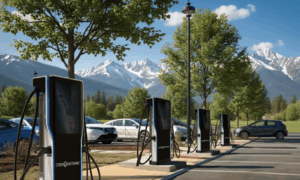
Home / EV Charging News / The potential of solar-powered charging stations: Benefits and challenges of using solar energy to power charging stations and reduce dependence on the grid
In recent years, the demand for electric vehicles (EVs) has been steadily increasing as people become more aware of the environmental impact of traditional gasoline-powered cars. As a result, the need for efficient and sustainable charging infrastructure has become a priority. Solar-powered charging stations offer a promising solution by utilizing clean and renewable energy to power EVs. This article explores the potential benefits and challenges of using solar energy to power charging stations and reduce dependence on the grid.
Solar-powered charging stations contribute to a greener and cleaner environment. By utilizing solar energy, they eliminate the need for fossil fuel-based electricity, which significantly reduces greenhouse gas emissions. This sustainable approach helps combat climate change and promotes the transition to a low-carbon future.
Solar energy is a renewable resource, meaning it is readily available and free once the infrastructure is in place. Solar-powered charging stations can leverage this advantage to reduce the operating costs associated with traditional grid-based charging stations. Additionally, users can benefit from lower electricity costs, which can incentivize the adoption of electric vehicles.
One of the notable advantages of solar-powered charging stations is their ability to operate independently of the grid. This energy independence reduces reliance on centralized power systems and provides greater resilience during power outages or emergencies. By diversifying the energy sources for charging electric vehicles, solar power helps build a more robust and decentralized energy infrastructure.
While solar-powered charging stations offer numerous benefits, there are also challenges that need to be addressed for their widespread adoption.
Solar energy is intermittent and dependent on sunlight availability. The storage of excess energy for later use becomes crucial to ensure uninterrupted charging services. Developing advanced battery energy storage systems can help overcome this limitation by storing surplus solar energy and supplying it during periods of low sunlight or high demand.
The efficiency of solar panels can be affected by weather conditions such as cloudy days or heavy rainfall. Although advancements in solar panel technology have improved their performance in low-light conditions, it is still necessary to consider weather patterns and ensure alternative charging options are available during prolonged periods of limited sunlight.
The initial installation costs of solar-powered charging stations can be relatively high compared to traditional grid-powered stations. However, it is important to note that these costs have been decreasing in recent years due to technological advancements and economies of scale. As the adoption of solar energy continues to rise, the cost gap is expected to narrow further.
To maximize the potential of solar-powered charging stations and address the challenges mentioned, several innovative solutions are being developed.
Integrating battery energy storage systems with solar-powered charging stations can help overcome the limitations of intermittent solar energy. These systems store excess solar power and provide a reliable source of energy even during periods of low sunlight. By utilizing advanced battery technologies, charging stations can offer consistent and uninterrupted services.
Smart grid integration enables better management of energy flow and distribution. By incorporating intelligent grid systems, solar-powered charging stations can communicate with the grid, optimizing charging schedules based on energy demand and availability. This integration ensures efficient utilization of solar energy and reduces strain on the grid during peak charging periods.
Designing solar-powered charging stations with scalability and flexibility in mind allows for easier expansion and adaptation to changing needs. By adopting modular designs and considering future growth, charging station operators can accommodate the increasing demand for EVs and incorporate emerging technologies seamlessly.
Solar-powered charging stations have the potential to revolutionize the way we charge electric vehicles. With their environmental benefits, cost savings, and energy independence, they offer a sustainable solution to reduce our dependence on the grid and promote the use of renewable energy. While challenges such as limited energy storage and weather dependence exist, innovative solutions like battery energy storage systems and smart grid integration are paving the way for a more efficient and reliable charging infrastructure.



